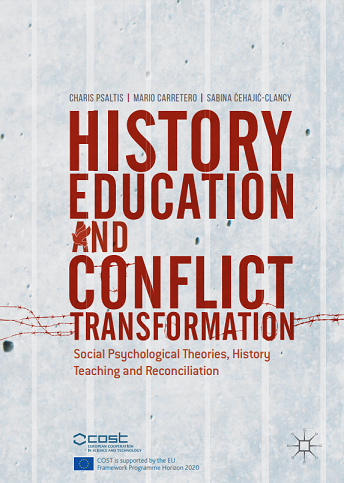
e-BOOK
History Education and Confict Transformation: Social Psychological Theories, Hystory Teaching and Reconciliation
Social representations of history are fundamental in forming social identities and are consequently critical for understanding intergroup relations. Social psychological approaches are vital for understanding how history education can contribute to confict transformation and reconciliation processes. In this volume, we discuss the effects, models and implications of history teaching in relation to confict transformation with an emphasis on how social psychological theories can enrich our understanding of history teaching in relation to confict transformation and reconciliation processes. This book is based on the contributions made by members of COST Action IS 1205, “Social psychological dynamics of historical representations in the enlarged European Union” coming from various countries who specialize in the study of post-confict societies. In addition to COST IS 1205 members, renowned academics were also invited to offer an international perspective on the role of history teaching in confict transformation including contributors from North and South America.
The contributors comprise a mix of well-established, mid-career and young researchers and academics who study various actors and factors involved in history education ranging from policy making, school curricula, textbooks, civil society organizations, teachers and teaching practices themselves. Many of the contributors are particularly interested in the role of social representations of the past and of history, and of the role of group-based emotions in intergroup conficts and reconciliation processes. The contributors are also in the in processes of prejudice
reduction, intergroup contact, apologies, guilt, shame, regret, forgiveness, moral exemplars and confict transformation. They all draw on various social psychological theories that attempt to understand processes of confict transformation and reconciliation in the context of post-colonialism, post-cold-war transition, post-confict societies, genocide and the holocaust drawing valuable links between social psychological theories and various aspects of history education.
A distinct characteristic of this volume is that it stresses the importance of an approach to history teaching that is transformative at all levels of analysis (intrapersonal, interpersonal, intergroup/positional and social representational/ideological). The list of contributors comprises
social, developmental, cognitive and educational psychologists, historians and educators referring to various social psychological theories and models to better understand the way that history teaching could be enriched from an interdisciplinary perspective. Such an interdisciplinary perspective is described as transformative history teaching, in another outcome of the COST IS1205 network of researchers which is the publication of the “Recommendations for the History Teaching of Intergroup Conficts” (Psaltis et al. 2017). Transformative history teaching attempts a critical understanding of the confictual past through the cultivation of historical thinking, empathy, an overcoming of ethnocentric narratives and the promotion of multiperspectivity. The frst part of this volume discusses the state of the art from an international perspective on developments relating to (a) history textbook writing in post-confict societies (b) work from international, regional and local civil society organizations on history teaching and reconciliation with the purpose of identifying the various strategies, theories and models that inspired these initiatives and the extent to which they draw on social psychological theory explicitly or implicitly in confict transformation processes, and (c) lay representations of people in
relation to master narratives in post-confict societies in South Eastern Europe (Croatia, Serbia) and the Eastern Mediterranean (Cyprus) that give ample evidence of the pernicious effects of adherence to master narratives at the representational level as a block to confict transformation,
reconciliation and political compromise.
The second part of the volume deals with the question of perpetrator–victim dynamic and the specifc tensions arising from the asymmetrical confgurations of these different contexts (colonialism and holocaust) helpful and challenging at the same time. Believing that our work will be useful for academics and practitioners living and working in (post-) confict contexts has sustained us with positive energy throughout this process. We want to especially thank members of the COST Action IS
1205 (http://www.cost.eu/COST_Actions/isch/IS1205) coming from various European countries and beyond.
Ketersediaan
| 037 | 390.19 | Website | Tersedia |
Informasi Detail
- Judul Seri
-
-
- No. Panggil
-
390.19
- Penerbit
- Switzerland : Palgrave Macmillan., 2917
- Deskripsi Fisik
-
xx, 384 hlm.
- Bahasa
-
Inggris
- ISBN/ISSN
-
978-3-319-54681-0
- Klasifikasi
-
390.19
- Tipe Isi
-
-
- Tipe Media
-
-
- Tipe Pembawa
-
-
- Edisi
-
-
- Subjek
- Info Detail Spesifik
-
-
- Pernyataan Tanggungjawab
-
Charis Psaltis
Versi lain/terkait
Tidak tersedia versi lain
Lampiran Berkas
Komentar
Anda harus login sebelum memberikan komentar
 Karya Umum
Karya Umum  Filsafat
Filsafat  Agama
Agama  Ilmu-ilmu Sosial
Ilmu-ilmu Sosial  Bahasa
Bahasa  Ilmu-ilmu Murni
Ilmu-ilmu Murni  Ilmu-ilmu Terapan
Ilmu-ilmu Terapan  Kesenian, Hiburan, dan Olahraga
Kesenian, Hiburan, dan Olahraga  Kesusastraan
Kesusastraan  Geografi dan Sejarah
Geografi dan Sejarah